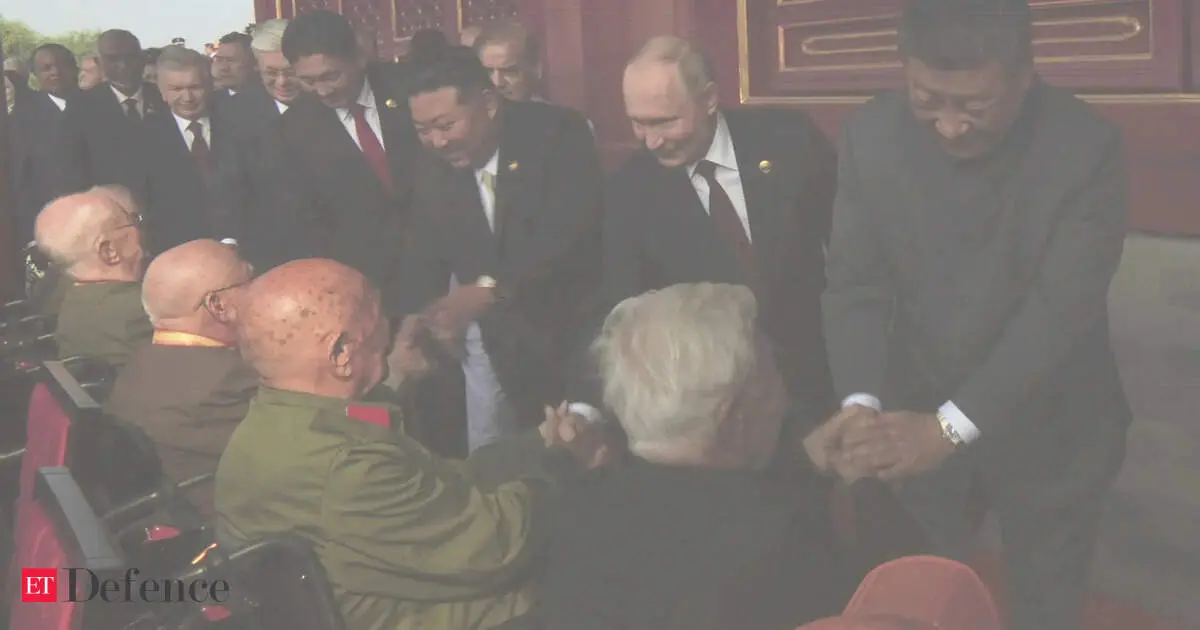Beijing: China’s largest military parade on Tiananmen Square showcased President Xi Jinping’s ambitions for a new geopolitical landscape, signaling a shift away from U.S. influence. Key global leaders, including Russia’s Vladimir Putin and North Korea’s Kim Jong Un, attended the event, emphasizing China’s rising military prowess. With over 50,000 spectators, the ceremony celebrated World War Two’s end and cast China as a formidable player in international relations, amidst a backdrop of U.S.-China tensions.
A New Dawn: The Military Parade in Beijing
On a historic September morning, the bustling streets of Beijing transformed into an arena of military showmanship as China held its most significant military parade in decades, celebrated at Tiananmen Square. The event marked the 80th anniversary of Japan’s defeat in World War Two and represented President Xi Jinping’s ambitions on the global stage. With a backdrop of intense geopolitical shifts, this display was not just about military might but also about China’s vision for a new international order.
As Xi strode up the red carpet flanked by prominent leaders like Russia’s Vladimir Putin and North Korea’s Kim Jong Un, the underlying message was clear: China is ready to assert its influence in an increasingly multipolar world. Over 50,000 spectators gathered, eagerly anticipating a 70-minute spectacle that included aerial displays, marching troops, and an impressive showcase of military advancements such as hypersonic missiles and unmanned drones. Major roads and schools were shut down in preparation for this extraordinary event, indicating the level of importance placed on the occasion.
Challenges to the American Order
Xi’s speech during the parade emphasized a narrative of China transitioning from the humiliation of historical invasions to becoming a formidable global powerhouse. He intends to shed light on the significant roles China and the Soviet Union played in defeating fascism, portraying them as champions of the postwar order. In a week that saw rising tensions between the U.S. and China, especially regarding trade wars and tariffs under President Donald Trump’s “America First” policy, the parade served as a clear message.
Interestingly, when asked about the military showcase, Trump dismissed it as a threat, asserting that “China needs us much more than we need them.” The response underscores the complexities of U.S.-China relations, hinting at an uneasy equilibrium going forward.
Data Table: Overview of the Military Parade
| Feature | Details |
|---|---|
| Location | Tiananmen Square, Beijing |
| Date | September 3, 2023 |
| Duration | 70 minutes |
| Notable Attendees | Xi Jinping, Putin, Kim Jong Un |
| Spectators | Over 50,000 |
| Key Highlights | Aerial displays, hypersonic missiles, unmanned drones |
| Historical Significance | 80th Anniversary of Japan’s defeat in WWII |
Strengthening Alliances
Recent events have also illuminated the growing strategic alliance between China and Russia. With Putin capitalizing on the parade to further bilateral energy deals, this gathering wasn’t merely a display of military strength but a strategic meeting of minds among non-Western leaders. Kim Jong Un’s participation marked his first appearance at a major multilateral event since taking power and notably coincides with growing international scrutiny of North Korea’s nuclear ambitions. His daughter, Ju Ae, also made her international debut, hinting at the dynastic plans Kim may have for the future.
The overarching narrative of this gathering was carefully crafted, with the Chinese government mobilizing thousands of volunteers and Communist Party members to ensure order and prevent any signs of dissent. This meticulous preparation reflects a regime keenly aware of the stakes involved, both domestically and internationally. According to Wen-Ti Sung, a fellow at the Atlantic Council’s Global China Hub, “President Xi will use this opportunity to showcase how the military is clearly, unmistakably behind him.” This strong military backing is essential as Xi seeks to navigate complex global dynamics in the years ahead.
The Way Forward
In the context of rising global tensions, particularly with the United States, China aims to position itself as a leader advocating for a new global order unencumbered by what it views as ‘hegemonism’ from Western powers. As Xi urges nations to unite against such pressures, the ramifications for the global landscape remain profound. With international organizations such as the IMF and the World Bank watching closely, the implications of these developments could shape the contours of global governance in the coming years.
The military parade was not simply a showcase of strength but a significant event in the history of post-war geopolitics. As the world watches, China’s moves will be scrutinized, with many countries now reassessing their positions regarding trade, diplomacy, and military alliances. What remains clear is that as the U.S. tries to maintain its legacy as a global leader, China is poised to challenge this status with innovative strategies and meaningful alliances—ushering in a new era in international relations.
Bankerpedia’s Insight 💡
China’s military parade underscores its ambition to reshape the global order, presenting a subtle challenge to Western dominance, particularly the U.S. This growing assertiveness can lead to increased geopolitical tensions, impacting India’s banking and finance sector by creating uncertainties in trade and investment flows. As India navigates this landscape, stakeholders should remain vigilant, assess risk exposure, and explore diversifying investments. Proactive measures can mitigate potential impacts from fluctuating geopolitical dynamics while positioning businesses for new opportunities in an evolving global market.
What Does This Mean for Me? 🤔
- Salaried Person → Increased global uncertainty may affect job security.
- Business Owner → Increased geopolitical tension may affect international trade policies.
- Student → Increased geopolitical tensions may affect global education opportunities.
- Self-employed → Increased geopolitical tensions may affect self-employed business stability.
- Homemaker → Increased geopolitical tensions may affect household stability.
- Retiree / Senior Citizen → Increased geopolitical tensions may affect retirement security.
- Job Seeker → Increased global tension may impact job market opportunities.
- Farmer / Rural Citizen → Increased geopolitical tension may disrupt rural agricultural markets.
Research References 📚
- economictimes.indiatimes.com
- RBI
- SEBI
- Ministry of Finance
- NABARD
- Department of Financial Services (DFS)
- IMF
- World Bank
Loved our Research? ❤️
Bankerpedia turns financial confusion into clarity!
Subscribe to our YouTube channel for unbiased insights, financial literacy & practical banking wisdom.










